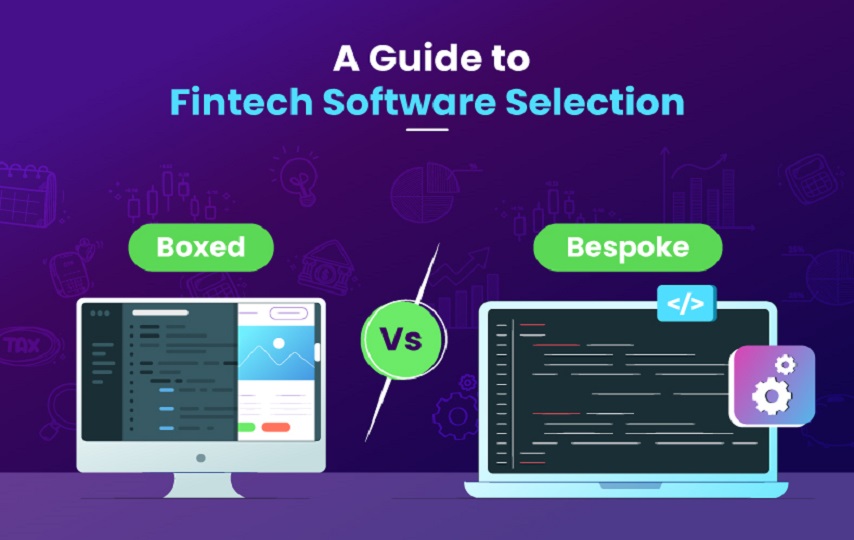In the rapidly evolving fintech arena, where innovation drives success, choosing the right software path becomes a defining factor for any company’s journey. Fintech, at its core, combines financial expertise with cutting-edge technology. This fusion comes to life through software solutions that underpin the operations of fintech companies. The choice between ready-made (boxed) and custom-made (bespoke) fintech software is a big decision, impacting how companies offer financial services and adapt to industry changes.
So, if you are considering financial software development, first, you need to decide between boxed and bespoke. This decision significantly impacts critical factors such as flexibility, security, cost-efficiency, and the capacity for innovation. As you navigate the financial technology landscape, carefully consider the pros and cons of each option to make an informed choice that aligns with your unique goals in a competitive environment.
Boxed Software in Fintech
Boxed software, also known as off-the-shelf or pre-packaged software, refers to ready-made software solutions designed to serve a broad range of industries or functions. These solutions come with pre-defined features and functionalities, typically not customized for a specific organization.
Benefits
Boxed software can have relevance in the fintech industry, although it is typically more limited in its applicability than bespoke (custom-built) solutions. Here are the advantages of boxed software in fintech:
- Rapid Deployment: Boxed software is typically pre-built and ready for use, allowing fintech companies to deploy it quickly. This speed is especially beneficial when there’s a need for swift market entry, aligning with MVP development strategies to test concepts rapidly.
- Cost-Effectiveness: Off-the-shelf software often proves cost-effective in the short term. Fintech startups and smaller companies can benefit from lower initial costs than custom development.
- Proven Reliability: Boxed software has often undergone extensive testing and has a track record of reliability. This reliability extends to API development, as many boxed solutions provide standardized APIs that can be easily integrated.
- Time Savings: Ready-made software saves valuable time, as there’s no need for lengthy development cycles. This advantage is particularly crucial when fintech companies aim to get their products or services to market swiftly.
- Industry Standards: Many boxed solutions in fintech are designed to comply with industry standards and regulations, reducing the burden of ensuring compliance during API development and MVP launches.
- Community Support: Boxed software often has a user community and support system. This can be advantageous when fintech companies require assistance with API integration, troubleshooting, or updates.
Limitations
While boxed software offers several advantages, it also comes with certain limitations, including:
- Limited Customization: Boxed software is designed to cater to a wide range of users and industries, which can limit its customization options. Fintech companies may find it challenging to tailor the software to their specific needs, especially when it comes to unique financial services.
- Scalability Constraints: As fintech businesses grow, they may outgrow the capabilities of boxed software. Scaling with increasing transaction volumes, user bases, or additional services can be challenging with off-the-shelf solutions, potentially requiring costly workarounds or migrations.
- Vendor Lock-In: Choosing a boxed software solution may result in vendor lock-in, making it challenging to migrate to another system or adapt to changing business needs. This can limit a fintech company’s flexibility and long-term adaptability.
Common Examples in the Fintech Industry
Boxed software includes various applications and tools widely used for standard financial processes in the fintech industry. Common examples include:
- Accounting Software: Software like QuickBooks or Xero, designed for financial record-keeping, budgeting, and reporting.
- Payment Processing Solutions: Services such as Square and Stripe offer payment processing capabilities for businesses.
- Customer Relationship Management (CRM): CRM software like Salesforce that helps fintech companies manage customer interactions and relationships.
- Regulatory Compliance Tools: Software designed to assist in compliance with financial regulations and reporting requirements.
Bespoke Software in Fintech
Bespoke fintech software, also known as custom-built software, is software specifically developed to meet the unique and specific needs of a particular financial technology company or organization. Unlike off-the-shelf solutions, bespoke fintech software is crafted from the ground up, considering the company’s individual requirements, workflows, and business processes.
Benefits
Bespoke software is relevant in the fintech industry due to financial services and technology’s unique and evolving nature. Here are the benefits of developing custom software in fintech:
- High Level of Customization: Bespoke software is custom-crafted to align perfectly with the unique demands of the fintech industry. This tailored approach ensures that fintech firms can gain a competitive advantage by creating unique features and functionalities through custom software.
- Scalability and Adaptability: Bespoke solutions are designed with scalability, accommodating the rapid growth typical in fintech. As transaction volumes, user bases, and financial offerings expand, custom software can evolve to meet these needs.
- Compliance and Security: Bespoke fintech software ensures regulatory compliance, including blockchain-based authentication for data security and privacy. It empowers enhanced security measures, safeguarding against cyber threats while meeting regulatory requirements.
- Streamlined Efficiency: Custom software optimizes workflows and enhances operational efficiency within fintech organizations. Processes can be tailored to exact specifications, resulting in quicker transaction processing, reduced errors, and overall improved performance.
- Enhanced User Experience: Fintech firms can create software with the end-user in mind, providing a superior user experience. Intuitive interfaces, seamless interactions, and user-centric design improve customer satisfaction and loyalty.
Limitations
While bespoke software offers many advantages, it also comes with limitations and challenges when applied in the fintech industry. Here are some key limitations of bespoke software in fintech:
- Higher Initial Costs: Developing custom software for fintech applications can involve higher initial costs than off-the-shelf solutions for tailored development and testing processes.
- Ongoing Maintenance Burden: Bespoke fintech software necessitates continuous maintenance, including updates, bug fixes, and security enhancements, which can lead to long-term operational costs and resource allocation.
- Risk of Project Delays: Custom software projects within the fintech industry may face the risk of delays, scope changes, and potential setbacks if not managed effectively. It can impact fintech firms’ agility in a rapidly evolving landscape.
- Extended Time-to-Market: Developing custom software within fintech can take longer to complete, potentially affecting the time it takes to bring innovative fintech products and services to market.
Common Examples in the Fintech Industry
While the exact examples of bespoke software can vary widely based on individual requirements, here are some common examples of customized software solutions that are often developed for fintech companies:
- Algorithmic Trading Platforms: Fintech companies often develop custom trading platforms that use algorithms to execute high-frequency trades and manage portfolios.
- Robo-Advisory Systems: Customized robo-advisory software provides automated investment advice and portfolio management based on individual client profiles.
- Payment Processing Solutions: Fintech firms may create custom payment processing software to facilitate transactions, money transfers, and currency conversions.
- Blockchain-Based Smart Contracts: Custom smart contract solutions are developed for automating and securing financial agreements using blockchain technology.
- Digital Banking Platforms: Custom digital banking platforms offer services such as account management, budgeting tools, and mobile banking applications.
- Regtech (Regulatory Technology): Bespoke regtech solutions help fintech companies comply with financial regulations, including KYC, AML, and CDD requirements.
- Cryptocurrency Exchanges: Fintech companies operating cryptocurrency exchanges often build custom trading platforms for cryptocurrency trading and wallet management.
Boxed vs. Bespoke Fintech Software: Basic Comparisons
Here are the basic comparisons of boxed and bespoke fintech software:
| Feature | Boxed | Bespoke |
| Customization | Limited customization based on pre-set features. | Highly customizable to meet unique requirements. |
| Initial Cost | Lower upfront cost due to pre-built solutions. | Higher initial cost for tailored development. |
| Deployment Speed | Quick deployment with minimal setup time. | Longer development time, potentially delaying launch. |
| Scalability | May have limitations in scalability. | Scalable to accommodate growth and evolving needs. |
| Regulatory Compliance | May meet basic compliance, but customization can be limited. | Tailored to meet specific regulatory requirements. |
| Competitive Advantage | Limited differentiation due to standardized features. | Opportunity for a competitive edge through unique features. |
| Maintenance | Generally lower ongoing maintenance requirements. | Requires ongoing maintenance, including updates and security enhancements. |
| Time-to-Market | Quick time-to-market due to pre-built solutions. | Longer development may impact time-to-market. |
How Will Fintech Companies Make the Right Choice?
The choice between boxed (off-the-shelf) and bespoke (custom-built) fintech software is a crucial decision that companies should make based on their unique needs, resources, and strategic objectives. Here’s how fintech companies can make an informed choice:
- Assess Your Needs: Begin by thoroughly assessing your fintech company’s specific needs and objectives. Understand the unique requirements of your business, including scalability, regulatory compliance, security, and customization.
- Consider Cost Analysis: Evaluate the cost implications of each software option. Compare the initial investment, ongoing maintenance expenses, and potential return on investment. Ensure that your choice aligns with your budget constraints.
- Plan Scalability: Consider your company’s growth projections. Assess how each fintech software solution can scale to accommodate increasing transaction volumes, user bases, and additional services, ensuring long-term viability.
- Think about Regulatory Compliance: Examine the regulatory environment in which your fintech operates. Determine whether each software option can meet industry regulations and standards, minimizing compliance risks.
- Consider Security and Customization: Prioritize security and customization. Evaluate how each option addresses data security and privacy, especially when handling sensitive financial information. Consider the level of customization required to align with your business model and provide unique fintech services.
Final Thoughts
The choice between boxed and bespoke software in fintech depends on unique needs and circumstances. Boxed software is convenient and cost-effective but may lack customization. Bespoke software offers tailored solutions but comes with higher costs and development time. Fintech companies must evaluate their specific requirements, budget constraints, scalability goals, and regulatory obligations to make the right choice. The decision should align with the company’s long-term strategy, and a hybrid approach may provide the best balance. Adaptability and responsiveness to changing market dynamics are key to success in the dynamic fintech landscape.







